My COVID vacation
My COVID enforced vacation started when I abandoned La Paz in Baja California Sur to head to Portugal, where I was turned-back from their recently closed border and sent packing to the United States. I landed in a beautiful place in the northern Adirondack park owned by a dear friend, and vacant for the winter.
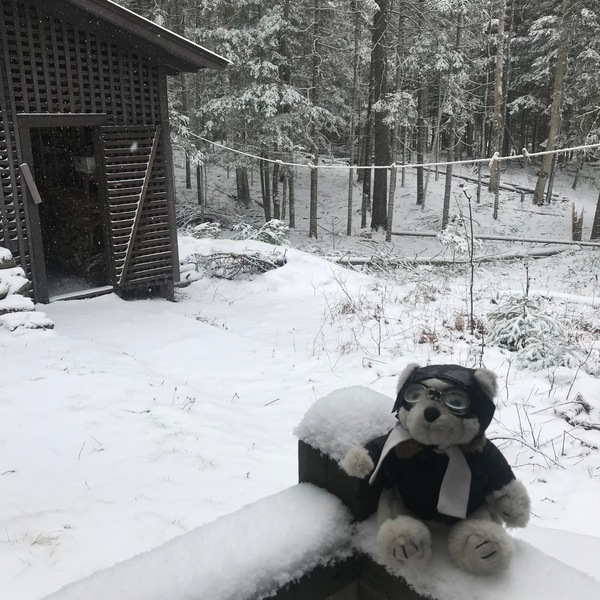
At first, it was cold and inhospitable outside. I worked my way through some of the books on the bookshelf while learning to regulate the wood stove. There were two books of note.
Jonathan Raban’s Passage to Juneau, which in part explores the aboriginal northwest coastal people’s experience of and relationship with the natural world. That exploration is richer, more nuanced, insightful, and far more interesting than the respect-for-nature clichés we sometimes get fed about native Americans. As one example, they viewed the water the way we view a landscape, rich in features with place names and markers. We tend to view a body of water as a naked expanse with something on the other side.
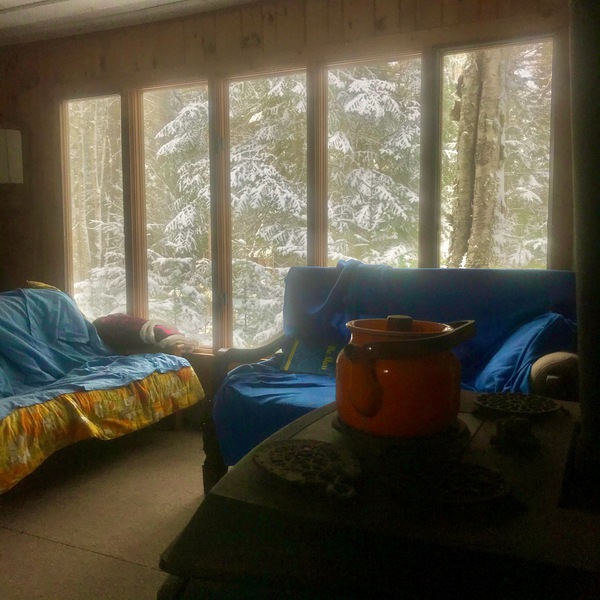
H.A. Rey’s The Stars is by far the best ever exploration of the night sky as it appears to us when light pollution and clouds don’t interfere. I decided to get serious, and learned a bunch of constellation and star names, including how to find and identify them. We had a few clear nights to practice when I, with some effort, overcame my fear over being outdoors in the wild, in complete darkness, in the cold, and went out into the clearing or down by the lake to look.
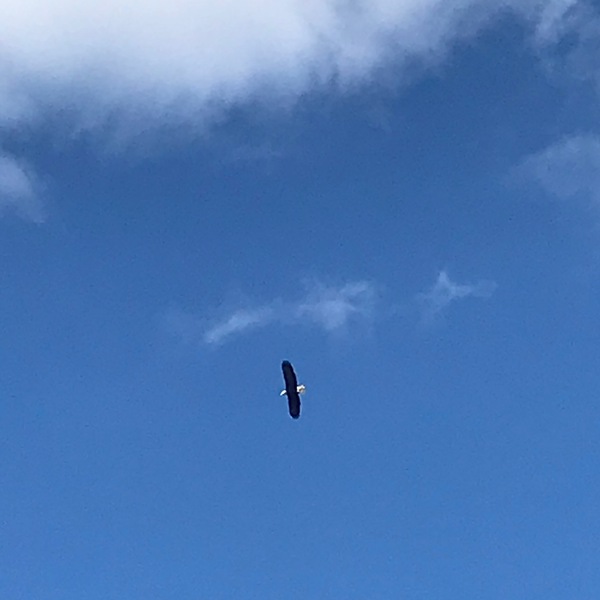
I found a few basic books about sailing and navigation rules on the bookshelf. I read those as review to make sure I hadn’t missed much. As always, there were things that I had missed or that needed reinforcing. Having navigated these primers, I bought Chapman and have gotten through half of it. I also downloaded Bowditch and likewise have made it through halfway.
I found a couple of mistakes in Bowditch– editorial glitches –communicated them, and received responses from the editors with corrections. That responsiveness impressed me. Did the slowdown make us slow down so we can attend to important things?
There were two apps that I wanted on my phone as a future sailboat dweller. One was an organizer that would help me search for that thing I know I have but can’t remember where it is. The app, “My Containers” by Robert Hartman, Jr. turned out to be perfect.

The other app was one which tells time using ship’s bells. I couldn’t find an existing one that worked. My computer was sitting idle. I learned something of the Swift programming language from Apple and wrote the app. My friend Andrés in Uruguay made me a super sweet icon for it. If only the app looked that good!
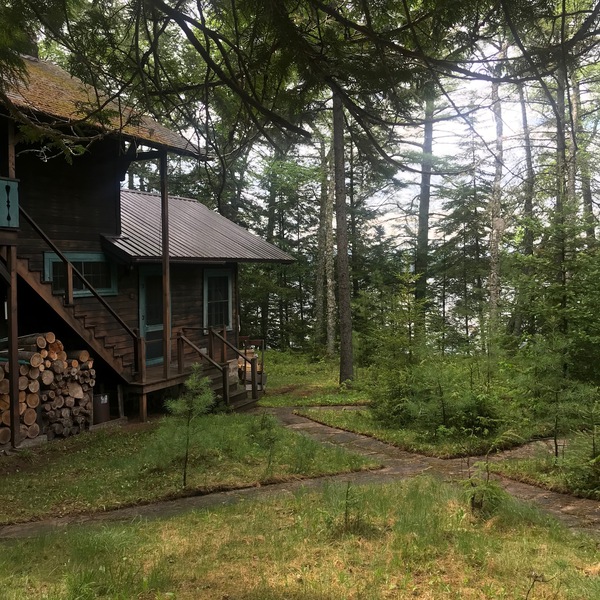
When it got a little nicer outside, I started staying out for hours at a time, usually in the afternoon. First I raked. There was a lot of lawn debris all over the grounds. I raked-up bushels of it, moving it in a wheelbarrow to the leaf pile composting in the woods below one of the buildings.
Having done that, I looked at beautiful stone walks around the property that had generous encroachments of moss and sod working their way in from the edges. Would there be any harm in edging those? I thought not, and did it.
Those outdoor projects took up a couple of weeks of afternoons. Having done them, I thought “Well, now what?” When you think that, be careful.
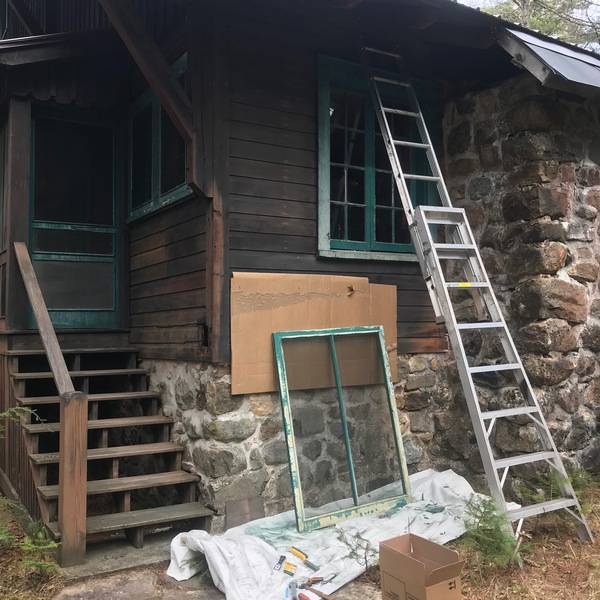
I got permission from my friend to work on repainting the trim on the buildings. It hadn’t been painted in over twenty years. The peeling paint everywhere showed it. This turned-out to be a much bigger job than I’d envisioned, and I’d envisioned that it would be a big job. Firstly I reduced scope from all of the buildings to the main building. Secondly, I added hours. It kept me busy through the six weeks in which the landscape altered from winter to early summer.
There were perks, too.
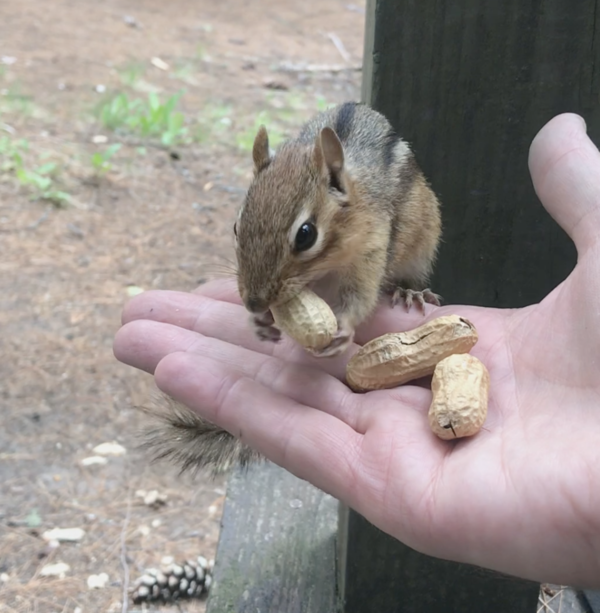
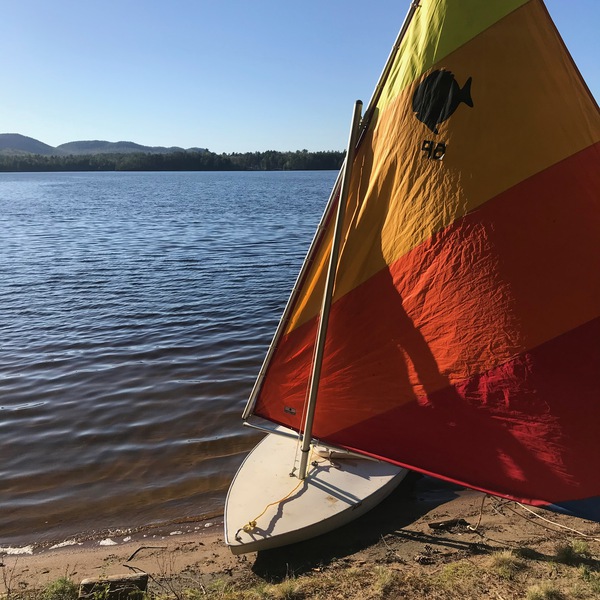
- I lay in the sun when the weather was fine.
- I took the kayak out on the lake.
- The neighbor loaned me a sunfish to sail.
- I trained a chipmunk, my only companion, to sit on my hand and take whole peanuts.
- I dreamed a lot, did a lot of sailboat browsing on the internet, bothered a few sellers to tell me more about them.
- I talked with my friends and family quite a bit, maybe a little more.
- I continued to work on my Spanish, writing and posting some of the essays I’ve written as exercises together with my Spanish teacher.
- Many evenings I streamed movies or serial episodes on the good internet.
Apple TV had a serial, “For All Mankind” which was in the setting of the Apollo space program only, what if the Russians had gotten first to the moon and the space race had continued? (Did the Russians actually try for the moon? I’m not sure they picked up the gauntlet. To us, in the United States, we were definitely racing to the moon. We made the “by the end of this decade” bar set by President Kennedy.)
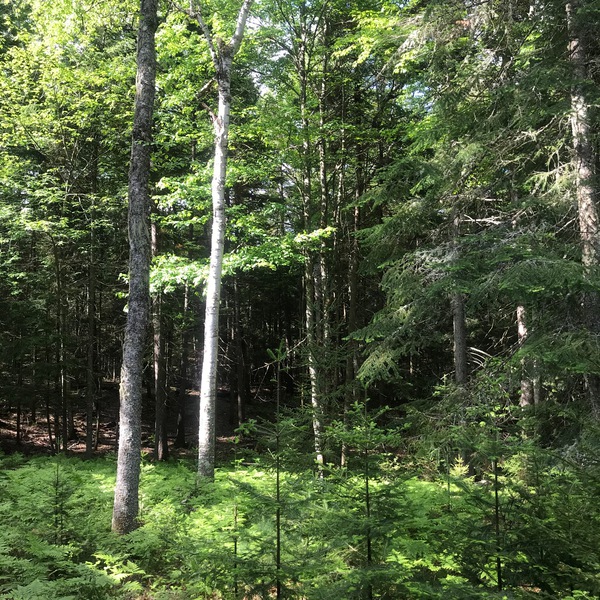
The serial, “The Morning Show” was great because of how it depicted television journalism and sexual harassment. Reese Witherspoon was brilliant. I loved her character, Bradley Jackson, who always tried to keep it real. The TV executive character Cory Ellison had a sharp wit and impish, take chances attitude that was fun to watch. And of course there’s Jennifer Aniston. I’ve always been in love with Jennifer Aniston. Me and a thousand other guys and I’m no Brad Pitt; but Jennifer, if you’re listening, let’s have coffee.
One movie I especially liked was from Apple TV. Called, “The Banker”, it is about some black men who became successful realtors by renting to black people when others wouldn’t. Later they tried banks, lending to black people when others wouldn’t. That’s when they got into trouble. White folks didn’t like it when black folks moved into the building. When their savings started being loaned to black folks, they drew the line.
I watched with joy the marches and with dread the rioting that broke-out all over the country in reaction to cell phone video capturing yet another police killing of an innocent black man. A friend turned me on to a book by Ta-Nehisi Coates, Between the World and Me. Framed as story told to his son, it relates his personal experience of being black, identified as a race by the world of people who identify as white. He defines race as “the organization of people beneath, and beyond, the umbrella of rights.”
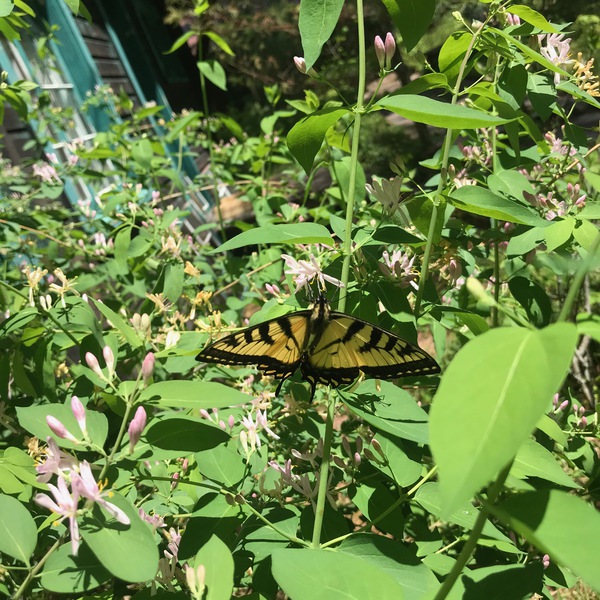
There’s no other purpose to race. He writes early on, “race is the child of racism, not the father.” Members of polite society deny being racist; however, if we think in terms of race, if we identify a race, we are already racist. By definition. Better to admit it. The United States has a racist society. Whether an individual is bigoted or not, that is another question, and more likely a question of degree than of essence. We are, however, racist.
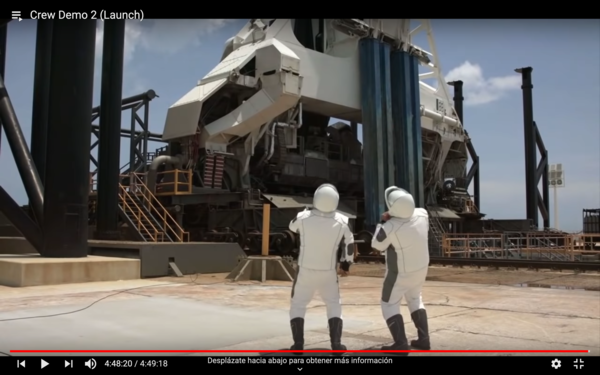
At the same time as people all over the country were demonstrating, we got to see two Americans launch to the international space station from the United States– the first U.S. manned mission in about a decade, since the shutdown of the space shuttle program. It was like 1969 all over again.
So here I was, from the equinox marking the beginning of the sidereal year up to the solstice that marks summer in the northern hemisphere. I burned through half the firewood in the wood shed, which is a goodly amount. I consumed a bottle of bourbon, one of tequila, and one of rum, which is more than my usual annual intake.
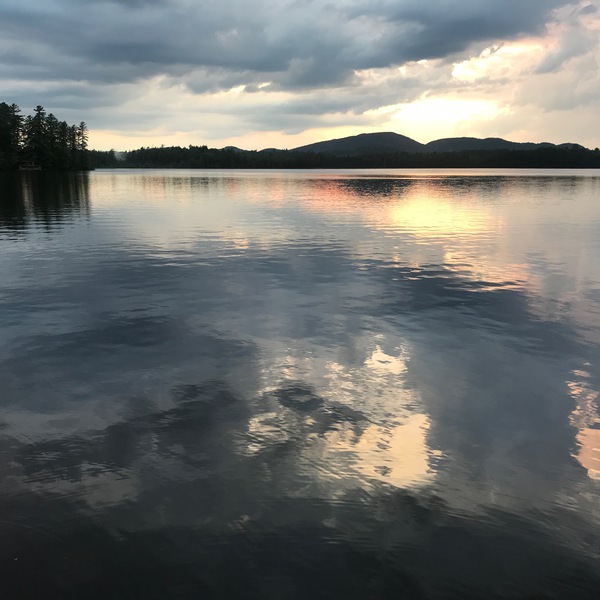
I ate through $780 of groceries including three jars of peanut butter, thirty pounds of flour, fourteen pounds of rolled oats, five and a half pounds of raisins, twelve pounds of rice, eight pounds of legumes, and ten pounds of peanuts.
Add three bags of whole peanuts for the chipmunk. This was less than she would have liked; but, I tried to ration. I won’t always be there for the chipmunk.
As with most of us, not once did I eat out. As with many of us, not once did I order in. Believe it or not, ordering in was possible, even far out in the woods by the lake.
At the beginning of the isolation period there was a big run on toilet paper. Someone suggested to me that this was because people have no idea how much toilet paper they use, and didn’t want to err on the side of too little. My data point is this. Three months equals one, one-thousand sheet, single-ply roll.